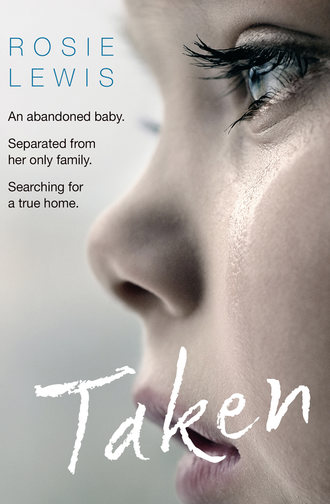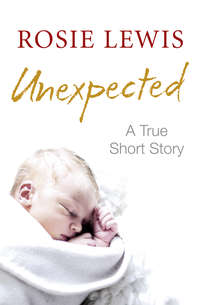
Полная версия
Taken
The shock was marginally cushioned by the confirmation that Zadie had been several months pregnant when she arrived (the part of me concerned with holding on to a job I loved relieved that it hadn’t happened while she was in my care), but she was so young and vulnerable that it was difficult to imagine her sneaking off to meet someone against her father’s wishes. The hideous alternative possibility, that she hadn’t had any choice, lurked, unacknowledged, somewhere in the back of my mind.
Driving away from hospital the next morning, guilt washed over me. Zadie had spent ten weeks in my care but hadn’t felt able to confide in me – a failing that no foster carer would be keen to admit to. Not only that, but I had overlooked signs that now seemed so obvious, such as her unexplained nausea, frantic exercising, no evidence of monthly periods – I felt such a fool.
My mother had held the fort at home and it was a relief to share some of my fears for Zadie over a cup of tea when I got back. It was only after she’d left that the wider implications of Zadie’s pregnancy began to sink in.
Soft mutterings from Megan’s carrycot interrupted my thoughts and drew me to the dining room, and as I lifted her up the first thing I realised was that she had slept for a whole hour without crying out in pain. Thrilled at this first sign of progress, I kissed her forehead, her soft skin warm against my lips. Her small splayed fingers moved purposely through the air as I carried her along the hall, her lips moving with such deliberation as she stared up at me that it really felt like she was miming. ‘Yes, I know what you’re trying to tell me, my love, I know,’ I said, smiling down at her. ‘Your first comfortable sleep. I’m very happy about that too.’
The living room looked like the storeroom in the basement of a shockingly disorganised branch of a baby-merchandising retailer. Apart from all the usual baby equipment, there were baby gifts dotted all around the room; a pink and white blanket crocheted by my mother, a pile of assorted furry and velour soft toys and fluffy blankets from our neighbours all along the street, and a small pink kitten from Peggy.
I was just contemplating the arrival of a second baby in the house and all the associated regalia that might entail, when another thought struck me – what if Peggy decided, when she heard the news, that two babies and a teenager was too much for one foster carer to cope with? Might she worry that my attention would be too thinly stretched? If that was the case, there was a chance that, on the basis of ‘last-in, first-out’, Megan might be moved on to another foster carer.
A fair number of the foster carers at Bright Heights Fostering Agency operated a strict ‘no babies’ policy, but there were plenty of others who loved caring for newborns.
I lowered Megan onto her padded mat and gently removed her wet nappy. Her legs were still so thin and scrawny that I couldn’t wait to tuck them back into her sleep suit, for fear they might break. As I dabbed her bottom with damp cotton wool, my eyes fixed on the stump of an umbilical cord clinging stubbornly to her tummy. It was sad to think of any baby being parted from their mother so soon after birth. I felt a pang in my chest at the prospect of Megan going through yet another separation so early on in her life.
Chapter Seven
When Zadie came home the next day she broke down and told me the whole horrific story – she had fled the family home to escape her abusive elder brother, and by then she was already three months pregnant. After talking to me she fell into an exhausted sleep and, with Megan asleep in her carrycot, I took the opportunity to email a report to Peggy while the disclosure was still fresh in my mind.
Foster carers are encouraged to keep detailed and accurate notes because, in some cases, their records are summoned by the courts to form part of the case for the prosecution in any criminal trial. I force myself to listen passively if a child makes a disclosure, however strong the temptation to elicit more information from them. Most children possess a strong desire to please and so, if they’re asked a question more than once, there’s always a risk that they might alter their answer in the mistaken belief that they haven’t said what the adult wants to hear. In that way, well-meaning carers asking intrusive questions can influence a child’s testimony, thereby prejudicing the case.
Peggy called after breakfast the next morning, shock and concern audible in her tone. Her voice had that slightly echoey quality created by activating the loudspeaker mode and instinctively I lowered my voice, feeling slightly self-conscious. We discussed Zadie and the prospect of her continuing with the pregnancy and then I took a deep breath. ‘What about Megan?’
‘No change as far as I’m concerned,’ Peggy said in that definite, no negotiation tone of hers. ‘I can’t think of a better way for Zadie to learn about caring for a baby than watching someone she trusts do it, can you?’
Relieved, I leaned against the wall and loosened my grip on the cord of the telephone. It sprang out of my hand and vibrated against the receiver. ‘No, no, I can’t. Thanks, Peggy,’ I added after a moment, slightly worried that I’d been worrying in the first place. I was well aware that I needed to keep myself in check, striking the right balance between giving Megan everything she needed, everything she deserved, and all the while bearing in mind that our time together was limited.
‘Anyway, if things go to plan Megan might have moved on to adopters by then.’
‘Great,’ I said, pleased that Peggy was still committed to keeping to tight timescales in Megan’s case. There was no doubt that making the transition from foster to forever family early on in her life would help to minimise any lasting sense of trauma and loss – we were often told in training that separating a child from their main caregiver could have profound effects, interfering with their development and the quality of all of their future intimate relationships as well as impacting on their self-esteem, social skills and long-term mental health – and, infinitely less important but nonetheless also present in the back of my mind, it would be easier for all of us to let her go. ‘Now, before I forget, Megan’s LAC review is scheduled for tomorrow at ten. I’ll need you there obviously.’
‘Tomorrow?!’ I cried, exasperated. ‘That’s a bit late notice to arrange cover, isn’t it?’ Looked after children, or LAC, reviews were meetings held at regular intervals during a child’s time in care to discuss their care plan and keep everyone involved in looking after them – the child’s parents, their foster carers, school or nursery teachers, health professionals and, in certain circumstances, police officers – updated in terms of their progress and any difficulties they may be experiencing. In other circumstances I would have been happy for Emily to babysit while I popped out, but local authority rules dictated that looked after children must only be cared for by registered back-up carers with a minimum age restriction of 18.
Peggy tutted. ‘Well, you’ll just have to bring the children along if you can’t organise something in time.’ There was a crackle on the line and a shuffling of papers. I pictured the social worker tapping urgent notes in a Word document using one finger on the keyboard and motioning silent, stern commands to the administration staff around her with the other.
A whirlwind character, Peggy never held back from speaking her mind and I had heard on the grapevine that her blunt honesty had put one or two noses out of joint in her office, particularly those of the senior management. Despite being sent on repeated diversity and equality training refresher days, she refused to toe the party line simply to keep her bosses happy, steadfastly sticking to her strongly held views.
Once, so I’m told, she brought her dog into the office for a week when he was unwell, in direct defiance of instructions from above. Through closed doors, in the middle of a heated ‘discussion’ with one of her line managers, Peggy was overheard to say, ‘I haven’t taken a day off sick in ten years, not a single one, which is more than I can say for you lily-livered lot with your stress vacations and mini-breakdowns. Now, either Pug stays and I work, or I’m taking unpaid leave until he’s better. It’s up to you.’ Despite misgivings, the manager caved in and Pug spent the week resting in his basket underneath Peggy’s desk.
One of the joys of working with someone like Peggy was that you could say exactly what you thought and she never took offence, although you had to be prepared to hear her own opinions pointed out in no uncertain terms. I had often thought that if Alan Sugar ever needed a replacement sidekick to keep a stern eye on the applicants in The Apprentice, Peggy would have been his ideal woman.
‘Someone here can watch them for an hour if needs be but it’s not very convenient. I’d rather you made other arrangements.’
Chapter Eight
As it was, I didn’t have to bring the children along. Emily and Jamie were both out with their dad for the day and my mother was more than happy for me to drop Megan and Zadie over to her while I went. The LAC review was to be held in one of the interview rooms at the local authority municipal buildings and Peggy was waiting in reception when I arrived. Solidly built, with steely grey hair and heavy-framed glasses, she angled her chin when she saw me, a greeting I had come to accept as friendly, though until I drew closer and she smiled, it looked anything but.
Des, my supervising social worker from Bright Heights Fostering Agency, usually accompanied me to LAC reviews but plans were in place for him to transfer to the US to conduct research into a youth scheme that was working well there. With a mountain of paperwork to catch up on before he left, he had sent me a text to say that he wasn’t sure whether he’d make it to the meeting. Apart from the statutory visit each month that he was obliged to make, I had heard very little from him in the past weeks, although he had paid us a flying visit in the week, to meet Megan. Having developed a close friendship with him since becoming a foster carer, I missed his impromptu visits and calls.
Angie, the midwife who had overseen Megan’s care in hospital, was standing at Peggy’s side. She held her arms out when she saw me and after giving me a hug the first thing she wanted to know was how Megan was doing. I was about to tell her when Peggy said, ‘Shall we get on, ladies?’ She rammed the thick file she was holding under her arm and turned, marching wheezily in the direction of the lifts. Angie raised an eyebrow and we exchanged smirks, like chastised schoolgirls, before falling into step behind. ‘Christina’s not here yet but we’ll go ahead without her,’ Peggy said as the lift moved towards the second floor. I had been feeling a bit nervous about meeting Megan’s birth mum after witnessing her volatility at the hospital and so was quite relieved to hear that. ‘The morning’ll run away with us otherwise and I’ve got far too much to do.’
The interview room was tiny, so small that it was a struggle to open the door wide enough to get inside. A long table took up the entire width of the space, leaving no gap at either end to access the mismatched chairs on the opposite side. The chairperson, a thin man in his early forties with a well-manicured beard and coppery, thinning hair, was already seated in one of the nearest chairs. Standing awkwardly in the cramped quarters, he shook our hands and introduced himself as John Noble.
‘It was the only room free, sorry, everyone,’ Peggy said, her voice booming off the walls. ‘Now, I would climb over there, but I’m not sure I’d ever make it out again. At least, not without a hoist.’
‘It’s all right, I’ll go,’ I offered, pleased that I was wearing trousers. I perched on the desk and swung my legs over the other side, taking a seat on one of the unforgiving wooden chairs. Angie followed my lead and sat beside me. Peggy thanked us, taking one of the seats opposite with a loud humph. John retook the seat beside Peggy and glanced at his watch. It was almost ten o’clock, the time the meeting was scheduled to begin.
‘Christina’s not here,’ Peggy told John. ‘I received a call from the legal team earlier, which I’ll tell you about in a moment. I suggest we start on time and if she turns up we’ll have to recap. Agreed?’
Peggy’s tone invited compliance and we all nodded our agreement. John went on to tell us that he was present to mediate between the different parties and ensure the correct procedures were followed, but without Christina present it was unlikely that any disagreements would arise. After introducing ourselves, Angie was invited to give a summary of Megan’s health-care needs and I was surprised to hear that there were some concerns about her hearing as well as her low weight.
Apparently, a test conducted in the hospital soon after Megan was born had suggested that there might be some loss of hearing, and the details had been recorded in her red book. While I had skimmed through the log, in truth I had been so focused on dealing with her symptoms of withdrawal that I hadn’t taken much notice of anything else. I knew that children with neonatal abstinence syndrome could suffer a range of health, behavioural and learning difficulties, and my heart squeezed at the possibility of little Megan having so much to contend with. I felt a sudden stab of fury towards her birth mother.
Angie must have noticed the unease on my face because she was looking at me when she said: ‘Just because we failed to get a clear response from the first hearing test doesn’t mean we won’t at the next one. It’s difficult to test hearing in a baby as young as Megan and the results are certainly not conclusive. We find that, for most, their hearing improves when their cleft is corrected.’
I nodded my thanks to Angie and at John’s invitation I summarised Megan’s first week at home. I told them that she had been prescribed an antacid and that her sickness had eased a little. ‘She’s coping well, bless her. I’m beginning to see light at the end of the tunnel.’
Angie tilted her head to one side and gave me a warm smile. After updating them on Megan’s routines and general well-being it was Peggy’s turn to address the meeting, and what she had to say took us all by surprise. ‘Christina was arrested yesterday for shoplifting,’ she said, looking at each of us in turn. ‘Her probation officer has been in touch with our legal team to say that she’s been bailed and was released this morning. Heaven knows where she is now.’ The social worker sighed and then looked at Angie. ‘I have to say, any suggestion of disability isn’t going to help us in tying things up quickly this end. Most adopters run a mile at the mention of health problems.’
Angie held up her hands. ‘It’s a consideration at this stage, that’s all. Megan’s head circumference is on the small side but we’d expect that with NAS babies and, as I said, newborn hearing tests aren’t conclusive. Megan will need a repeat test in a few weeks to see if the results are the same. If they are, she’ll be referred to an audiologist.’
Peggy nodded decisively and then moved on to discuss Megan’s care plan. Usually, when a baby is removed from its mother, an assessment is undertaken to establish their ability to parent, but since Christina’s drug-dependence problems were so severe, Peggy was almost certain that she would relinquish her parental rights of her own accord.
It was unusual for parents to give up their rights to their children without a fight, in my experience, although it sometimes happened, particularly when they knew in their hearts that they weren’t able to care for them. If Christina contested the local authority’s plans to permanently remove Megan from her care though, a lengthy legal process would follow, with lots of toing and froing between Christina’s representation and the local authority legal team. It wasn’t unusual for cases to take anything up to two years or more to resolve, so I was happy to hear Peggy reiterating that she was confident of a speedy resolution.
‘We’re making efforts to trace Megan’s birth father at the moment, which is proving to be more complex than you might think,’ Peggy said with a coded glance. ‘Christina is insistent that’ – she glanced down, consulting her notes – ‘Briz Clark, her most recent partner, the one she fled from, isn’t Megan’s father, although as you probably know, we need to demonstrate to the court that we’ve exhausted all avenues of enquiry in finding him, whoever he may be, before we rule the option out. Of course, if he’s found he may want to be considered to care for Megan, but my guess is that Christina is simply plucking names out of the air and hoping she’ll come up trumps. She isn’t at all sure who he is.’
Angie inclined her eyebrows meaningfully and blew out some air. After establishing that no one had anything further to add, John proposed a date for the next review and closed the meeting. Angie gathered her belongings and gave me a quick hug. Peggy inclined her head. ‘Thank you, Angie,’ she said, as the midwife shuffled herself back over the table. ‘You too, John.’ The chairman shook our hands. I grabbed my bag ready to follow them out but Peggy lifted her hand. ‘Rosie, would you stay a moment? I’d like a word if I may –’
John held the door open for Angie and when it was just the two of us left, Peggy asked how Zadie was coping after the shock confirmation of her pregnancy. I had just finished updating her when the door swung open and crashed into the back of Peggy’s chair. The social worker’s jaw dropped, one of her habitual habits, and she turned around.
Both of us stared at the young woman standing in the doorway.
Chapter Nine
‘Fuck, what you doing sitting in a cupboard?’ Christina demanded of Peggy in the rich, husky tone I remembered from the hospital. I hadn’t noticed it then, but Megan’s birth mother was clearly from the Newcastle area; her Geordie accent unmistakable in the confined space.
‘I wanted somewhere small enough to contain you in case you flew off the handle again,’ Peggy retorted, standing up with a groan and rubbing the small of her back. She tilted the back of her chair and ushered Christina in, the vague twinkle in her eyes the only clue that she wasn’t completely serious.
Christina was wearing a short denim skirt, black ankle boots and a closely fitted, low-cut top. She looked so slender that I never would have guessed she’d recently given birth if I hadn’t known already. ‘What d’you expect?!’ she cried, though without the venom I might have expected. There was a degree of warmth in their rapport, suggesting that Peggy and Christina knew each other of old. After slamming the carrier bag she was holding and a mobile phone with a large glossy screen onto the table, Christina slumped heavily into the nearest seat, sideways on, one elbow hooked over the back. She ran her eyes around the pokey room and sniffed. ‘Well, ain’t this the dog’s bollocks?’
Peggy returned to her own seat. ‘Strictly speaking, Christina, this meeting is over.’
Christina scowled and shifted herself around. ‘Christ almighty, this chair’s hard! Where’s the cushions?’
Peggy shook her head and sighed. ‘Fucking government,’ Christina continued, oblivious to the social worker’s stern glare. ‘Snatch your kid before the nurse’s even stitched up your oo-jah, then can’t be arsed to give you proper chairs. Bloody arseholes!’ She twisted her legs around, rested her elbows on the top of the carrier bag and fell into conversation with me. ‘They took her off me the minute I dropped,’ she said in a nasally tone, the skin around her nostrils red and sore, as if she’d blown her nose too much. ‘Plain. Fucking. Rude.’ Each word was stated with a noisy slap on the table. ‘I’m sick to the back teeth of it all, to be honest.’
Peggy’s mouth twitched at the corner. She breathed out so that her nostrils flared, and then composed herself. ‘Megan needed immediate medical care, Christina. You were told that was likely after your 20-week scan. You jolly well knew what was going to happen and don’t pretend otherwise.’ I was surprised to see how easily Peggy confronted her and how naturally relaxed she seemed; I guessed that, in her job, being able to construct a dialogue with all sorts of people while challenging them as well was a valuable asset.
‘Yeah well, you know you’re gonna croak one day, don’t mean you’re fucking happy about it,’ Christina snapped, unfolding her arms and banging her hands down on the table, the rings she wore on each finger jangling against the grey melamine top.
‘Christina,’ Peggy said with a warning note.
‘What? I’m telling it like it is, that’s all.’ She sniffed again and let her eyes roam the room. Her gaze finally settled on me. ‘Who’s she anyway?’ she asked in a tone that was suddenly perfectly reasonable and serene. She jerked her head in my direction.
‘This is Rosie Lewis, Megan’s foster carer.’
‘Oh right,’ she said, looking at me from the corner of her eye now she knew who I was. ‘Beautiful, ain’t she?’ she asked and there was a note of aggression in her tone, as if daring me to disagree. I was used to that and knew better than to expect instant trust when caring for someone else’s baby. It was something that grew slowly; each time a parent saw their little one clean and nicely dressed for contact, every time they found fresh nappies and wipes in the bag sent with them, or perhaps a photo addressed to Mummy or Daddy tucked away somewhere for them to find. Trust usually came in time.
I nodded, smiling. ‘Absolutely, yes, she’s gorgeous.’
Her jawline softened and she turned her face towards me again, leaning closer. ‘Ain’t nothing wrong with her, ’cept for that gap in her lip and loads of babies have that. I keep telling them she’s all right but they don’t wanna listen. All babies puke, it ain’t just Megan. She’s got it a bit worse, probably ’cos of the butter.’
I frowned. Opposite me, Peggy gave a sigh of exasperation.
‘What’s that face about? I ate a load of butter when I was pregnant. It was like one of them cravings or something. That’s what did it.’
‘Is that what they’re calling it these days?’ Peggy mumbled.
Christina cut across the social worker with a contemptuous look, turning her attention back to me. She looked worn out, which wasn’t surprising considering she’d recently given birth, but there was sharpness in her face too, in character rather than features. She looked knowing somehow, as if she’d gathered more experience through the years than most other twenty-somethings.
Her brown eyes were red-rimmed and watery, shadowed with heavy greyish pouches, and her irises were bloodshot and dull, as if she hadn’t slept in days. In some ways her appearance was a surprise; apart from looking extraordinarily tired and laid low with an apparent heavy cold, she was actually quite attractive, her dark blonde hair fluffy around her face and no trace of the wizened, emaciated look you expect of an addict. Without looking at Peggy she jabbed a thumb fiercely over her shoulder. ‘This is the sort of shit I get every time I come here. Nazis, the lot of them. They’re all the same. I don’t get told nuffink about my own baby. All they do is pick holes all the time.’
‘Well, it would help if you’d turn up on time,’ Peggy pointed out. ‘If you’d arrived at ten when the meeting began you would have heard all about how Megan is doing. We’ve discussed her care plan, daily routines, contact arrangements,’ she said, tapping each one off on her fingers with the forefinger of her other hand. ‘I can recap now, if you’d like? You have contact this afternoon as a matter of fact. You’ll be hosting, Rosie. I presume that’s OK?’
My eyes widened. Peggy had summarised contact times about twenty minutes earlier, but said nothing about me hosting the event. She had also emailed a copy of the contact schedule through to me a few days earlier, but no venue had been stated. ‘Uh, I –’ I floundered. Since the demand for supervised contact at family centres was high, social workers were often keen for foster carers to cover sessions in their own home, provided there was no threat to their personal safety. Issues surrounding contact were usually discussed at the beginning of a placement, when plans for the child’s care were set out by the social worker. Peggy hadn’t said a word about it, so I had naturally assumed the contact would go ahead without any involvement from me. It was typical of her to spring the idea on me.







